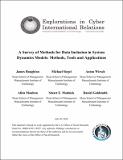Browsing Conference Proceedings by Title
Now showing items 21-29 of 29
-
Sets of signals, information flow, and folktales
(© Springer-Verlag, Berlin, Heidelberg, 2012-06-01)I apply Barwise and Seligman’s theory of information flow to understand how sets of signals can carry information. More precisely I focus on the case where the information of interest is not present in any individual signal, ... -
Story retrieval and comparison using concept patterns
(© The Association for Computational Linguistics, 2012-05-26)Traditional story comparison uses key words to determine similarity. However, the use of key words misses much of what makes two stories alike. The method we have developed use high level concept patterns, which are comprised ... -
The Story workbench: An extensible semi-automatic text annotation tool
(© Association for the Advancement of Artificial Intelligence, 2011-10-09)Text annotations are of great use to researchers in the language sciences, and much effort has been invested in creating annotated corpora for an wide variety of purposes. Unfortunately, software support for these corpora ... -
The strong story hypothesis and the directed perception hypothesis
(© Association for the Advancement of Artificial Intelligence, 2011-11-03)I ask why humans are smarter than other primates, and I hypothesize that an important part of the answer lies in what I call the Strong Story Hypothesis, which holds that story telling and understanding have a central role ... -
A survey of methods for data inclusion in system dynamics models: Methods, tools and applications
(© The System Dynamics Society, 2014-07-20)Numerical data is experiencing a renaissance because 1) traditional data such as census and economic surveys are more readily accessible 2) new sensors are measuring things that have never been measured before, and 3) ... -
Taking care: Four takes on the cyber steward
(Canada Centre for Global Security Studies (Canada Centre) at the Munk School of Global Affairs at the University of Toronto, 2012-03-18)Stewardship denotes a custodial, non-proprietary relationship to a resource or domain. The notion of a “cyber steward” resonates with those of us who regard cyberspace as a commons or domain that belongs to no one, and yet ... -
Towards better understanding cybersecurity: Or are "cyberspace" and "cyber space" the same?
(© Elsevier B.V., 2012-12-15)Although there are many technology challenges and approaches to attaining cybersecurity, human actions (or inactions) also often pose large risks. There are many reasons, but one problem is whether we all “see the world” ... -
Untangling attribution
(© National Academy of Sciences, 2010-01-01)In February 2010, former NSA Director Mike McConnell wrote that, “We need to develop an early- warning system to monitor cyberspace, identify intrusions and locate the source of attacks with a trail of evidence that can ... -
A view of top-down internet governance
(© NANOG, 2012-06-04)Does the audience want more government and regulatory involvement in peering and interconnection world?








